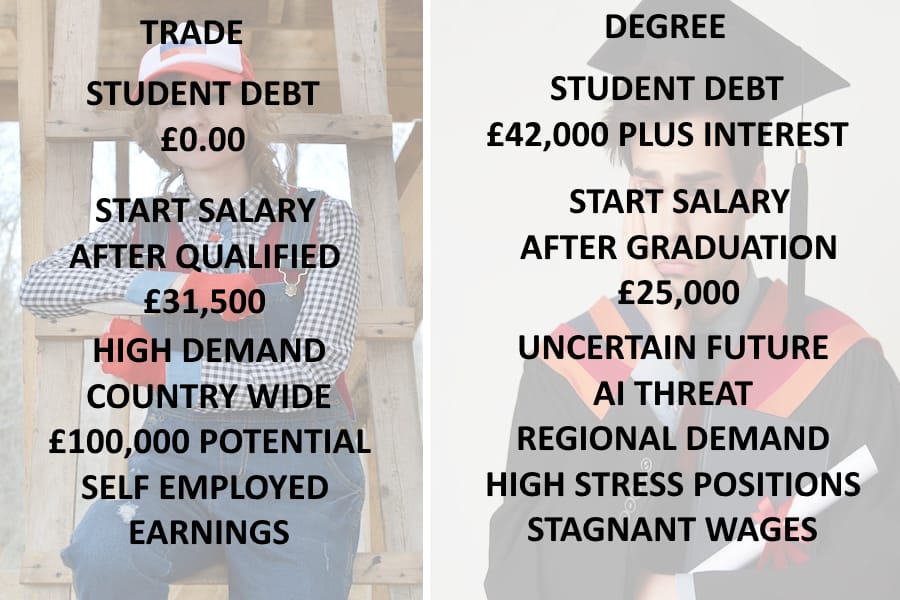University is Not the Future for British Teenagers

Publish Date: Last Updated: 18th June 2025
Author: nick smith- With the help of GROK3
A Personal Reflection on the Degree Dream
Growing up in Britain, the path to success was clear: get a university degree, and a prosperous life would follow. My parents, teachers, and peers all emphasized that without a degree, securing a good living would be an uphill battle. This narrative shaped my early years, pushing me toward academic pursuits with the promise of financial stability. But was this promise true? As I look back today, on May 29, 2025, at 04:04 PM BST, the data tells a different story—one that challenges the long-held belief that a university education is the only route to a thriving career.
The Reality of Graduate Earnings
The allure of a degree has faded as the earnings gap narrows. While a small percentage of graduates—often from elite institutions like Oxford or Cambridge studying high-demand fields like Computer Science (£85,400 after five years)—reach six-figure salaries, the majority do not. Recent analyses show that only a tiny fraction of UK graduates earn over £100,000 annually. The median starting salary for graduates has stagnated at around £30,000 for the past five years, with many fields like teaching (£37,805) or architecture (£38,228) offering modest returns. Moreover, the average graduate leaves university with a £42,900 debt (2023 figures), a burden that takes years to repay through taxed income.
University does offer undeniable benefits—networking opportunities, critical thinking skills, and access to fields like medicine or law that require degrees. However, these advantages come at a steep cost, both financially and in terms of opportunity. For many, the promise of a degree no longer aligns with the economic reality, especially as AI reshapes traditional career paths. Contrast this with trades: a private gas inspector can earn £100 per visit, completing 10 or more visits daily, potentially exceeding £1,000 daily or £250,000 annually—far surpassing most graduate salaries without the debt. Electricians average £47,265 yearly, with experienced ones reaching £50,000 or more. Bricklayers in London command up to £90,000, while carpenters earn around £41,413. These figures, drawn from 2024 data, highlight that tradespeople often outpace graduates, and they do so debt-free, having learned through apprenticeships rather than incurring tuition costs.
The AI Revolution and Job Displacement
As artificial intelligence (AI) progresses, its impact on the job market is undeniable. Lower- and middle-level entry roles in industries like finance and software development are increasingly automated. AI is already transforming industries like finance, where algorithmic trading systems powered by AI execute 70% of trades on major stock exchanges (2024 data), and software development, where tools like GitHub Copilot automate up to 40% of coding tasks (2025 report). A 2024 McKinsey study predicts that by 2030, 45% of entry-level finance roles and 30% of junior developer positions could be automated. This trend suggests that traditional career paths requiring degrees—once seen as secure—may become harder to enter, with competition intensifying as AI takes over repetitive tasks. A 2023 UK government report noted that AI could displace up to 20–30% of labor income by 2040, hitting white-collar sectors hardest.
Yet, one area remains resilient: trades like electricians, carpenters, and bricklayers. AI excels at digital tasks but struggles with the hands-on, contextual problem-solving required in construction or plumbing. Installing a consumer unit (£500 job for an electrician) or crafting bespoke furniture demands physical skill, adaptability, and human judgment—areas where AI lags. While AI may eventually impact trades, experts like the UK’s AI Council (2025) estimate at least two decades before robots can replicate the nuanced human judgment required, ensuring job security for now. The Trade Skills Index 2023 projects a 9% employment rise in construction trades over the next decade, with 244,000 apprenticeships needed by 2032 to meet demand, underscoring a persistent skills shortage that AI cannot fill.
The Case for Apprenticeships
If I were advising a young person in the UK today, I’d recommend an apprenticeship in a trade. The benefits are clear: no educational debt, immediate employment due to high demand, and income potential that rivals or exceeds middle management roles. Apprentices start earning around £178 weekly (above the £3.90 minimum for first-year apprentices), rising to £31,500 as qualified tradespeople—£7,000 more than the average graduate starting salary. Self-employed tradespeople can set their own hours and rates, with day rates of £150–£300 in cities like London, offering flexibility and autonomy.
Trades aren’t without challenges—physical demands, exposure to weather for outdoor roles like bricklaying, and economic cycles affecting construction demand can create uncertainty. Yet, these drawbacks pale in comparison to the £42,900 debt and uncertain job prospects many graduates face. With trades, you’re paid to learn, start earning sooner, and can often pivot to self-employment for greater control over your schedule and income. The demand is real: over 60% of construction SMEs struggle to hire bricklayers and carpenters, per the Federation of Master Builders (FMB), and the sector faces a potential shortfall of 62,600 workers by 2032 without increased apprenticeship completions. This shortage drives wages up, with scaffolders earning £38,100 and electricians leading at £33,636 (2022 ONS data), a figure still growing.
Voices from the Field
Sarah, a 24-year-old electrician in Manchester, shares, “I started my apprenticeship at 18, earned while I learned, and now make £48,000 a year with no debt. I’d never have this freedom with a degree.” Meanwhile, career advisor James Carter notes, “Trades are a lifeline for young people in regions like the North East, where construction demand is high, but we must address barriers—only 13% of apprentices are women (2024 data), and outreach to diverse communities is still lacking.” These perspectives highlight the real-world appeal of trades, though challenges like gender imbalance and regional disparities in apprenticeship access remain.
University: Not a Lost Cause, But a Targeted Choice
I am not suggesting that university is a lost cause for all. If you are smart, with a natural flair for science—fields like engineering, medicine, or data science—pursuing a degree can unlock exceptional opportunities. These core disciplines often lead to high-demand roles, with engineers averaging £55,000 and doctors £80,000+ after training, justifying the investment despite the £42,900 debt. However, for non-core degrees like English, History, or Arts—unless aimed at a teaching career (£37,805 starting)—the prospects are dimmer. Graduates with these degrees face unemployment rates of 7–8% (2024 HESA data) and starting salaries below £25,000, often outpaced by trades like carpentry (£41,413) or plumbing (£45,000). For most, the trade route offers a better chance of steady, reliable employment without the financial burden, aligning with the realities of an AI-driven job market.
Examining the Facts
Let’s test this instinct with the numbers. Over a 40-year career, a carpenter earning £41,413 annually from age 21, potentially rising to £60,000 as a specialist, could accumulate £1.6–£2.4 million, outpacing many graduates who start later and face debt repayment. However, tradespeople may face physical wear over time, requiring a shift to less demanding roles like project management (£50,000+). Graduates, while starting at £30,000, might reach middle management (£45,000–£60,000) after a decade, but their lifetime earnings of £1.4–£1.6 million (Sutton Trust, 2023) often come with less flexibility and higher stress. Job satisfaction also varies—tradespeople often report higher autonomy (FMB, 2024), while graduates in creative fields may find more intellectual fulfillment, though not always financial reward. The 2024 Trade Skills Index forecasts a 4.3% wage inflation in construction due to shortages, boosting trade incomes further.
Moreover, trades offer stability. While AI disrupts office jobs, physical trades remain essential—building homes, fixing leaks, wiring homes for electric vehicles. The FMB’s push for quality apprenticeships ensures a sustainable skills base, countering the narrative that university is the only path to security. Posts on X also reflect a sentiment shift, with users noting trades like plumbing and electrician work as lucrative and AI-resistant, aligning with industry trends.
Conclusion
The old adage that a degree guarantees success no longer holds for British teenagers. With AI poised to reshape white-collar jobs, trades like gas inspection, electrician work, and carpentry offer a debt-free, high-earning alternative. Apprenticeships provide immediate employment, competitive incomes, and future-proof skills in a labor-scarce market. For today’s youth, skipping university for a trade might be the key to thriving in an AI-driven world—unless they possess a natural aptitude for science or core disciplines where degrees shine. The facts support this shift, and it’s time to rethink the future of education in the UK. Young people should explore apprenticeship programs like those offered by the National Apprenticeship Service (gov.uk), while policymakers must expand access to trades training, especially for underrepresented groups. How can our education system evolve to prioritize skills over degrees?
Recent AI News Articles
AI Questions and Answers section for University is Not the Future for British Teenagers
Welcome to a new feature where you can interact with our AI called Jeannie. You can ask her anything relating to this article. If this feature is available, you should see a small genie lamp above this text. Click on the lamp to start a chat or view the following questions that Jeannie has answered relating to University is Not the Future for British Teenagers.
Be the first to ask our Jeannie AI a question about this article
Look for the gold latern at the bottom right of your screen and click on it to enable Jeannie AI Chat.







